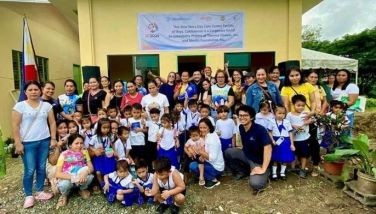DepEd banks on partnerships for SHS work immersion
MANILA, Philippines — The Department of Education (DepEd) is banking on the “strong partnerships” it has forged with the Philippine Chamber of Commerce and Industry (PCCI) and other industry groups as the Grade 12 students under the K-12 basic education curriculum take their work immersion course requirement.
Work immersion, according to the DepEd, is a key subject under the Senior High School curriculum that may be conducted in different ways and time frame as needed by SHS learners.
The subject provides learners opportunities to familiarize themselves with the workplace; to simulate employment, and to apply their competencies in areas of specialization/applied subjects in authentic work environments.
The SHS curriculum provides four “exits” for graduates – higher education, entrepreneurship, employment or middle-level skills development – where the first batch of Grade 12 learners is expected to become full-fledged contributors to social development and nation-building.
The DepEd noted that the K-12 Basic Education Program was created to equip graduates with values, knowledge and skills that communities, businesses and industries need.
The DepEd said it recognized the PCCI’s concern regarding the minimum number of training hours of SHS graduates, as it maintains its confidence on its partnership with the business group and continues to foster cooperation with various industry partners by addressing concerns that could arise as the work immersion subject is implemented.
Specifically, DepEd Order No. 30, series of 2017 or Guidelines for Work Immersion provides learners with access to industry partners’ facilities and employment simulation where they are given opportunities to apply their competencies, gain practical industrial skills and develop good work ethics and values relevant to pursuing further education and/or joining the world of work.
Under the DepEd order, a learner is required to render a minimum of 80 hours for work immersion.
Consequently, as provided by law, a child below the age of 18 but older than 15 must spend a maximum of 40 hours per week and no more than eight hours per day in the work immersion venue.
The same issuance does not limit a learner’s practical work experience hours to 80 hours and offers several delivery models from which schools may choose based on the number of hours (80 hours, 240 hours, 320 hours), learner’s purpose and needs, school capabilities and compliance to the Technical Education and Skills Development Authority (TESDA), Department of Labor and Employment (DOLE) and DepEd Work Immersion Guidelines.
Schools may also design their own delivery models as they deem fit for a specific situation or concern, subject to the approval of the Regional Office.
The K-12 program was crafted in close coordination with the Commission on Higher Education, TESDA and representatives of the business community. It aims to produce lifelong learners who are locally and globally competitive, and ready to pursue their desired path.
- Latest




























